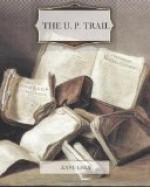A hand slipped into his—small, soft, trembling, exquisitely thrilling. Neale became still as a stone—transfixed. He knew that touch. No dream, no fancy, no morbid visitation! He felt warm flesh —tender, clinging fingers; and then the pulse of blood that beat of hope—love—life—Allie Lee!
36
Slingerland saw Allie Lee married to Neale by that minister of God whose prayer had followed the joining of the rails.
And to the old trapper had fallen the joy and the honor of giving the bride away and of receiving her kiss, as though he had been her father. Then the happy congratulations from General Lodge and his staff; the merry dinner given the couple, and its toasts warm with praise of the bride’s beauty and the groom’s luck and success; Neale’s strange, rapt happiness and Allie’s soul shining through her dark-blue eyes—this hour was to become memorable for Slingerland’s future dreams.
Slingerland’s sight was not clear when, as the train pulled away, he waved a last good-bye to his young friends. Now he had no hope, no prayer left unanswered, except to be again in his beloved hills.
Abruptly he hurried away to the corrals where his pack-train was all in readiness to start. He did not speak to a man. He had packed a dozen burros—the largest and completest pack-train he had ever driven. The abundance of carefully selected supplies, tools, and traps should last him many years—surely all the years that he would live.
Slingerland did not intend to return to civilization, and he never even looked back at that blotch on the face of the bluff—that hideous Roaring City.
He drove the burros at a good trot, his mind at once busy and absent, happy with the pictures of that last hour, gloomy with the undefined, unsatisfied cravings of his heart. Friendship with Neale, affection for Allie, acquainted him with the fact that he had missed something in life—not friendship, for he had had hunter friends, but love, perhaps of a sweetheart, surely love of a daughter.
For the rest the old trapper was glad to see the last of habitations, and of men, and of the railroad. Slingerland hated that great, shining steel band of progress connecting East and West. Every ringing sledge-hammer blow had sung out the death-knell of the trapper’s calling. This railroad spelled the end of the wilderness. What one group of greedy men had accomplished others would imitate; and the grass of the plains would be burned, the forests blackened, the fountains dried up in the valleys, and the wild creatures of the mountains driven and hunted and exterminated. The end of the buffalo had come—the end of the Indian was in sight—and that of the fur-bearing animal and his hunter must follow soon with the hurrying years.




